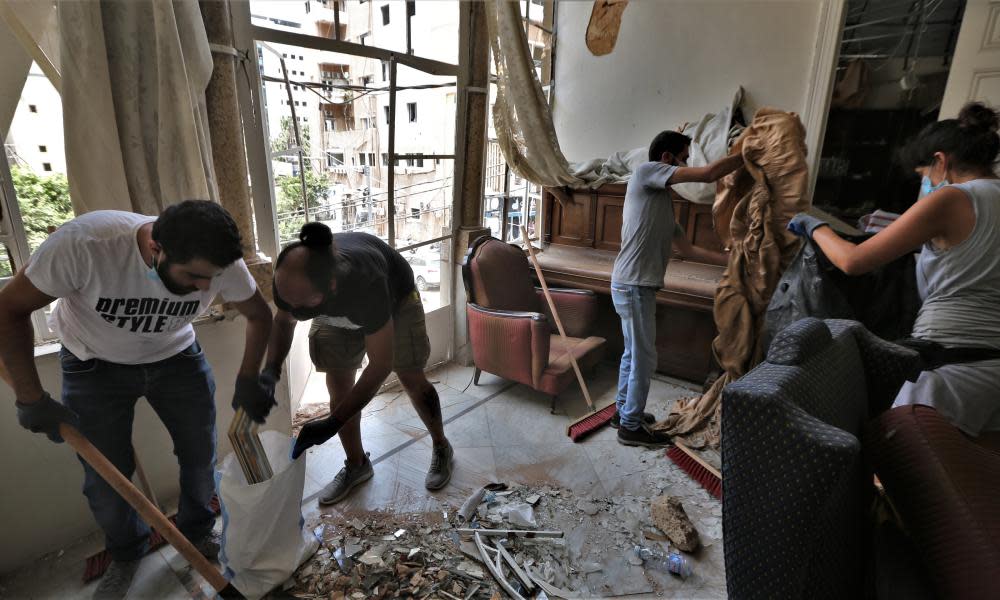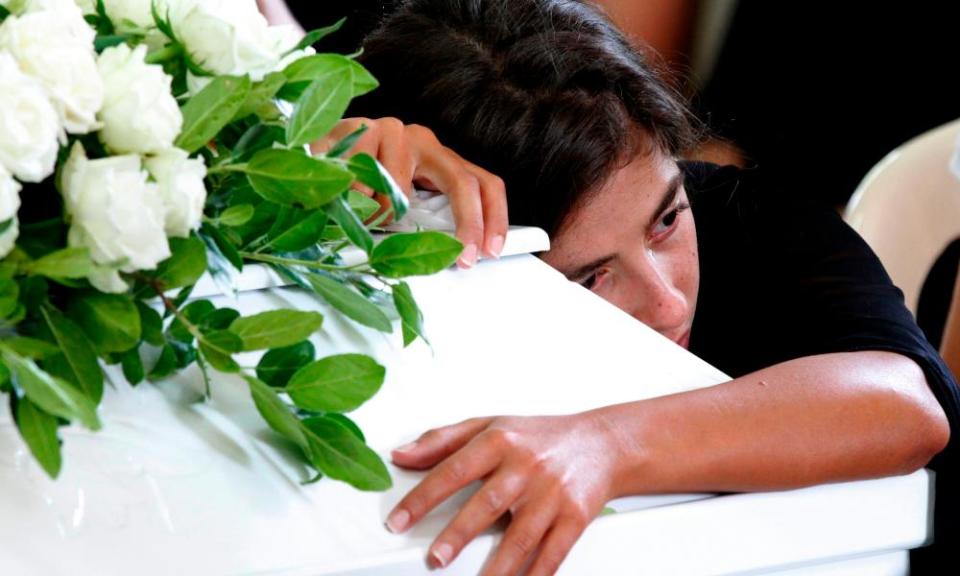No lights, no glass, no money: Beirutis hamstrung in efforts to rebuild

There is glass all over Beirut, but none of it is in the right places. Stooping to pick up a picture of her eldest son as a baby, Mathilde Abdo was careful not to prick her finger on the shards still sticking to the frame before she restored it to its rightful home on the bookshelf.
Even though Abdo, her husband, George, and five of their nephews have spent the last two days clearing up the chaos caused by the port explosion that devastated the Lebanese capital city, they are not even close to returning to normality to their flat in Ashrafieh, one of the neighbourhoods hit hardest by the blast.
“There is still glass everywhere. I think we might spend the rest of our lives picking pieces out of our clothes, our belongings,” she said. “I used to want my sons to come home after they finish university in France and contribute to Lebanon’s future. Now I will tell them to never come back. There is nothing for young people here.”
The Abdos are one of hundreds of thousands of families across the city picking through the rubble of their homes to rescue shattered memories. Photographs, school trophies, treasured family heirlooms: much of it is gone, or wrecked beyond repair.
The first funerals for some of the 137 confirmed dead were held on Thursday, as the search for those still buried under collapsed buildings across east Beirut continued. The Covid-19 shutdown, as well as the fact that the city usually empties out during the humid month of August, appear to have saved an untold number of lives - but the death toll is still rising steadily. More than 5,000 people have been injured, many unable to get proper care from ruined hospitals already filled with coronavirus patients.
“We are doing what we can, but we are not getting any support from the government,” said Garen, a 21-year-old student volunteering to search the wreckage, as he stood outside a damaged building in the heart of the Gemmayze nightlife district that looked on the verge of collapse.
As the city starts to recover from the shock of Tuesday’s unprecedented explosion, which appears to have been caused by a massive stash of ammonium nitrate stored illegally at the port since 2014, Beiruitis are starting to comprehend the scale of the task of rebuilding that lies ahead.
About 300,000 people have been made homeless and it is not clear how much of east Beirut’s infrastructure can be saved. Many of the low-rise buildings in working-class districts to the east of the port, razed several times in the civil war already, are expected to be earmarked for demolition. The cost of the damage could exceed $5bn (£3.8bn), Beirut’s governor, Marwan Abboud, estimated on Wednesday.
The Abdos, both teachers, have already lost savings in the economic crisis that has engulfed Lebanon since late last year. “We already had so many problems in this country,” said George. “We could not imagine that not having money to rebuild our home is one of them. And we have to stay here in case there is looting.”
Dahiyeh, the sprawling Hezbollah stronghold that makes up most of Beirut’s southern suburbs, was the scene of the city’s last major emergency when it was ripped apart by Israeli bombs during the 2006 summer war. This time around, Dahiyeh has escaped unscathed, and construction workers and craftsmen from the rest of the city have made rare ventures south in a search for building supplies and glass.

At a glass warehouse in the Dahiyeh neighbourhood of Laylaki, dozens of men were busy cutting huge sheets of glass and trying to salvage useable panes from the broken windows and panels that have been brought to them over the last two days.
“Normally I’m so bored at the shop I would love to talk to anyone new, but I’m so busy now, I can’t even think,” said the warehouse manager, who gave his name as Ali. “Using the cheapest glass we have, you can repair a normal-size window for about $8. The problem is that because of the financial crisis, no one has dollars any more.”
“On top of that, we import almost all of our stock from places like Germany and Saudi Arabia. Now the port is destroyed. So once we sell what we have, that’s it.”
The official rate for the Lebanese pound was 8,000 to the dollar on Thursday – more than four times what it was last year, when it was pegged at 1,500LBP to $1, sparking nationwide protests.
How to rebuild half a city with no money and no materials is the latest challenge facing a country that has finally broken after 30 years of post-civil war mismanagement, negligence and corruption.
On a crisis visit to Beirut on Thursday, the French president, Emmanuel Macron, inspected the damage as crowds formed around him demanding that any international aid or an International Monetary Fund bailout does not go towards bailing out a political class that has dragged Lebanon into a fresh disaster.
After sunset, the clean-up teams were forced to abandon their work because of the poor light: electricity, in short supply at the best of times, is now totally gone, and almost all the generators that used to keep the lights on have been destroyed.
Instead, crowds of young volunteers marched to Martyrs’ Square in the heart of the city, the scene of hopeful protests at the end of last year. “Revolution!” they shouted through masks, waving brooms and flags in the air.
Under a nearby highway bridge, street art blossomed during last year’s demonstrations. “Before I die I want Lebanon to …,” one piece read. In green spray paint below, someone had written:“Learn from the past.”

